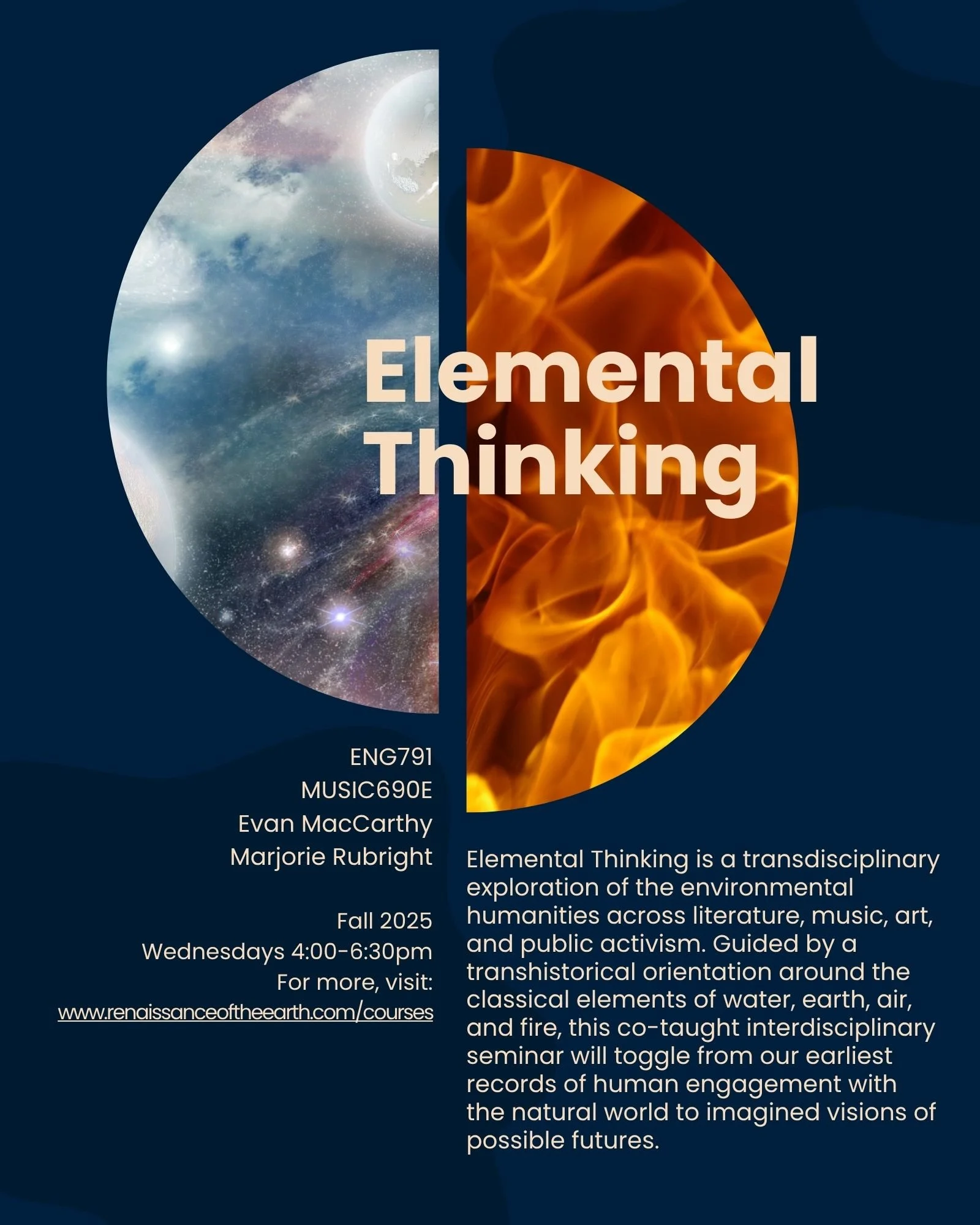Current Courses
ELEMENTAL THINKING — FALL 2025
Team Taught by
Marjorie Rubright
English (ENG791)
&
Evan MacCarthy
Music and Dance (MUSIC690E)
The Course Website can be found, here
Past Courses
The Poetics of Descent Workshop
Summer 2025—June 28 12-3pm
Scout Turkel, Renaissance of the Earth Teaching Fellow
During this generative working group, we will read and write in critical relation to concepts of descent and extraction in poetry — falling into, getting stuck below, and leaving behind “the earth.” In comparative conversation with the Kinney Center’s rare book collection, we will consider an array of poets who move beyond and below the earth-as-surface to critique representations of extraction and descent in geologic, mythic, and poetic history. Texts to be examined include Adam Lonicer's Kreuterbuch (1564), Ovid’s Metamorphoses (1632 edition), Alice Notley’s book-length epic The Descent of Alette (1992), and Muriel Rukeyser’s poem sequence “The Book of the Dead,” first published in U.S. 1 (1938). These texts will provide starting points for responding to the notion of "descent," across disparate centuries, in the mode of poetry.
This working group is designed to provoke conversation, writing, and thinking in trans-historical and trans-spatial dialogue among poets, scholars, and community members. Experience with writing poetry is not required for participation, but a willingness to write and think in a collaborative and poetic mode is necessary.
Living Methods:
Renaissance of the Earth in Verse
Summer 2024
Scout Turkel, Renaissance of the Earth Teaching Fellow
This poetry workshop considers the relationship between cultivating the earth and cultivating poetry. All interested individuals are invited to apply; this course is entirely free, and does not require university affiliation. Living Methods centers around the thing called “earth” (the globe, the soil, the place writing happens) with special attention to written and gardened evidence of the earth’s poetic history. We will turn our attentions to what writing in-place, as living beings, evokes for each us. We will consider the relationship between methods for keeping things alive — tending to the Kinney Center's grounds, observing the abundance of western Massachusetts summertime — and encouraging the liveliness of our own poetic projects. We will experiment with, share, and unfurl methods for living. Where we write will become inextricably linked to what we write, and we will attend to both sites with continued curiosity and care.
Writing on Earth
ENGL254 Fall 2023
Scout Turkel, Teaching Associate
Writing on earth considers the relationship between cultivating the earth, and cultivating a writer's practice. This thematic workshop centers around the thing called "earth" — the globe, the soil, the place writing happens. We will develop an awareness of writing as a cultivation practice, one that adheres to and plays with nature’s rhythms. In this workshop, writing on earth will not always mean writing "about" the Earth. Instead, we will see where the rituals of gardening and plant-life take us: love poems, flash fiction, memoirs, plays, dream descriptions.
Sustainable Living: Solutions for the 21st Century
NRC185 Spring 2023
Lena Fletcher, Lecturer
Students will work in teams to research and develop solutions to the sustainable challenges facing our society. They will collaborate to investigate, critically evaluate, effectively communicate, and reflect on the multifaceted challenges associated with addressing sustainable resource use, water, food, energy, transportation, waste management, and climate change. Students will also work in teams during class on exercises in which they research case studies, debate controversies, assess political and cultural contexts, and identify technological advances and barriers, gaps in scientific knowledge, and opportunities for change in the 21st century.
Environment and Society
NRC100 Fall 2022
Lena Fletcher, Lecturer
In this course, students will both individually and in teams explore the inherently interdisciplinary environmental challenges facing society. Students will engage in discussions, debates, and problem-based team projects to learn about, critically consider, reflect on, and address both local and global environmental problems. Students will investigate the impacts of human activities on forests, water, fish and wildlife populations, urban areas, and climate change. This course will prepare NRC majors for upper-level studies. Non-majors will develop an increased awareness and understanding of the environmental challenges facing our society, while also fulfilling the Interdisciplinary Science (SI) Gen Ed requirement.
permaculture design and Practice
STOCKSCH 286 Spring 2021
Lisa DePiano, Lecturer
This course includes in-class lectures, field trips, design studio and a hands-on field component, to offer students a deepened and applied practice in permaculture design process and techniques. The course culminates with students developing a permaculture design and community engagement process.
Vibrant Matter: Material Culture & Early Modern English Drama
ENG891 Fall 2020
Prof. Adam Zucker
This course is a research-intensive seminar focused on current scholarship on the representation, use, and history of material culture in the drama of Shakespeare, Ben Jonson, and their contemporaries. As we read a wide variety of canonical and not very canonical plays, we will consider questions that have organized the past 20 years of scholarship on ‘object’ studies: Why and how do objects and material spaces shape relations between subjects, and in what sense might objects and spaces be forceful agents in their own right? How do questions of environment, ecology, and global epistemology change when materiality is centered within them? How does the theatrical performance of human embodiment in particular (in its spatial and narrative forms) deal with or enact these questions? How might we balance historical research and presentist critique and rhetoric?
THE RENAISSANCE OF THE EARTH
ENG891 Spring 2020
Prof. Marjorie Rubright
This seminar stages a “collision laboratory” between literatures of the earth produced by Renaissance writers (1450 – 1750) and current popular, artistic, literary and scientific writings about the Anthropocene. It has two aims: first, to explore how seemingly current conversations regarding environmental disaster, sustainability, and resilience traffic in ideas, metaphors, and modes of thinking whose roots extend into the Renaissance; and, second, to consider how early modern habits of thought and practice might not only resemble the present but influence it, aiding in our challenge of imagining alternative forms of habitation and cultivation of the earth.







